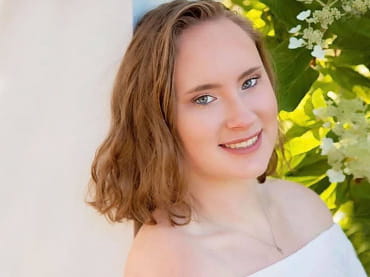The Challenge: 3 Concussions in Just a Few Years
An active soccer player for much of her life, collegiate athlete Anya's world was about to change. She sustained 3 concussions within a few short years.
Her first concussion, in September of 2016, occurred on the soccer field at her high school.
“I'm a goalie, so a ball was coming toward me. When I bent down to scoop it up, another player hit me in the head with her elbow, and I blacked out. I woke up to my teammate yelling my name and the athletic trainer guiding me off the field. I could barely walk or see," says Anya.
Right away, Anya went to a New York hospital where she had a CT scan. The results were normal. Doctors prescribed rest, ibuprofen, and time away from crowds and sunlight.
Anya's symptoms lessened over the years as she got ready for college, but they never fully went away.
Anya's main symptoms were:
- Headache
- Dizziness
- Nausea
- Fatigue
She'd wake up with a headache, go to bed with a headache, and rarely leave her room if she didn't have to. Even walking up and down the stairs was a challenge at times.
Getting ready to play college soccer at Carlow University in Pittsburgh in August 2019, Anya's symptoms only worsened. She suffered back-to-back concussions — numbers 2 and 3.
“After all of my concussions, I had the same debilitating symptoms that never seemed to go away," Anya says.
"After just one week I was seeing great improvement - I could go out in public, hang out with friends, and be my active self again. I feel more myself now than I did before." — Anya
Anya's Path to the UPMC Sports Medicine Concussion Program
During a summer league game at Carlow, Anya fell and hit her head on the ground. Then 2 days later, at goalie training camp, she bumped heads with another player.
UPMC Sports Medicine athletic trainers at Carlow University give all student athletes the ImPACT® baseline concussion test prior to their seasons. This baseline helps gauge if an athlete has sustained a concussion when they retake the test after a hit to the head.
“When I spoke to the trainers about recently having a concussion, they told me about UPMC and their concussion program," Anya says.
In a matter of days, Anya was at the UPMC Freddie Fu Sports Medicine Center in Pittsburgh's South Side. She met with Michael “Micky" Collins, PhD, director of the UPMC Sports Medicine Concussion Program, and Sabrina Jennings, PhD, a postdoctoral fellow.
“The level of care was phenomenal," Anya shares. “They seemed to have so much knowledge treating concussions and any kind of sports injury."
The Solution: Treating the Body's Balance Center
Drs. Collins and Jennings assessed Anya's condition, diagnosed her with a vestibular concussion, and designed an active treatment plan to help her heal.
A vestibular concussion is one that affects the body's balance center, which then affects one's ability to:
- Translate motion.
- Harmonize head and eye movements.
- Stabilize vision when moving the head.
These were exactly the symptoms that Anya had expressed to the doctors.
Her treatment would include vestibular and exertional therapy.
“Learning that there are six types of concussions shocked me," Anya says. “[The doctors] explained every exercise to me during the diagnosis and treatment, and it all made sense."
The Result: Playing Headache-free College Soccer
From beginning to end, Anya received treatment at the UPMC Sports Medicine Concussion Program for about one month. But even after one week, both the doctors and Anya were seeing major improvement.
Contrary to her prior treatment plans, UPMC's approach included active exercises that helped desensitize Anya's symptoms.
Rather than avoiding crowds, sunlight, and activity, Anya was to purposely place herself in those situations. It was the only way that her brain could adjust.
For an active recovery, Drs. Collins and Jennings had Anya:
- Run on a treadmill.
- Work out with a medicine ball.
- Practice many other exercises that involved movement and balance.
“Before I came to UPMC, I would wake up and go to sleep with a headache. But after a week of doing these exercises, no more headaches," Anya says. “It surprised me how quickly I was recovering. After just one week I was seeing great improvement. I could go out in public, hang out with friends, and be my active self again. I feel more myself now than I did before."
Dr. Collins cleared Anya in September of 2019.
Now she's back to doing what she loves — playing symptom-free as a goalie for Carlow University Women's Soccer.

















